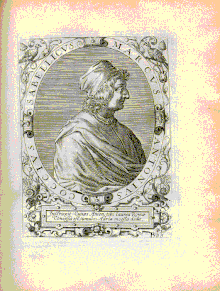Marcus Antonius Coccius Sabellicus: Difference between revisions
m Persondata |
|||
| Line 35: | Line 35: | ||
[[Category:1436 births]] |
[[Category:1436 births]] |
||
[[Category:1506 deaths]] |
[[Category:1506 deaths]] |
||
[[de:Marcantonio Sabellico]] |
|||
[[fr:Marcus Antonius Coccius Sabellicus]] |
|||
[[it:Marco Antonio Sabellico]] |
|||
[[ru:Марк Антоний Сабеллик]] |
|||
Revision as of 04:16, 1 March 2013

Marcus Antonius Coccius Sabellicus (1436–1506) was a scholar and historian from Venice. He is known for his universal history, Enneades sive Rhapsodia historiarum.
Life
Born in Vicovaro, his surname was originally Cocci; he took his Latinised name as a pupil of Pomponius Laetus.[1] He studied also with Porcelio Pandone and Gaspar Veronese.[2]
Sabellicus became professor of eloquence at Udine in 1473, but was dismissed in 1482. After a short period at Verona, he went to Venice, with the Venetian history he had written speculatively. He was given a teaching position as deputy to Giorgio Valla.[2] In 1487 he was appointed as a curator of the Biblioteca Marciana.
Works
Sabellicus while at Udine wrote an antiquarian work on Aquileia that appeared in 1482.[2] He then produced a Latin history of Venice, Historiae rerum venetarum ab urbe condita, with official encouragement; but it proved unpopular with the citizens.[3] He wrote further works concerned with Venice, and as a humanist scholar wrote commentaries on classical authors. The Enneades sive Rhapsodia historiarum appeared in 1498. His collected works were published in 1560 at Basel.[2]
The Historiae rerum venetarum had a first continuator, Andrea Navagero, who died having asked for his work to be destroyed. A second continuator, Pietro Bembo, was appointed in 1530, and he brought it up to 1513.[4]
An early poem in hexameters, De rerum et artium inventoribus, was an influence on Polydore Vergil, whom Sabellicus had helped with Guidobaldo of Urbino. It derives from the Historia Naturalis of Pliny the Elder, book VII, on the history of inventions.[5] It was also quoted verbatim by Otto Heurnius, writing in 1600 a pioneering history of "barbarian philosophy".[6]
Notes
- ^ Donald Cheney, Brenda Hosington, David K. Money, Elizabeth Johanna Weston, Collected Writings (2000), p. 299; Google Books.
- ^ a b c d Peter G. Bietenholz, Thomas Brian Deutscher, Contemporaries of Erasmus: a biographical register of the Renaissance and Reformation, Volumes 1-3 (2003), pp. 181–2; Google Books.
- ^ William J. Bouwsma, Venice and the Defense of Republican Liberty: Renaissance Values in the Age of the Counter Reformation (Berkeley, 1968), p. 90.
- ^ p. ix–xii;
- ^ Catherine Atkinson, Inventing Inventors in Renaissance Europe: Polydore Vergil's De inventoribus rerum (2007), p. 42–3; Google Books.
- ^ Francesco Bottin, Models of the History of Philosophy: From its origins in the Renaissance to the "historia philosophica" (1993), p. 107 note 8; Google Books.
